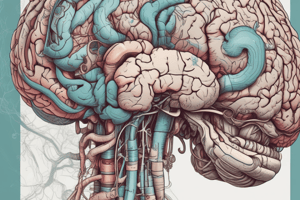Podcast
Questions and Answers
What is the brain?
What is the brain?
The brain is an amazing three-pound organ that controls all functions of the body, interprets information from the outside world, and embodies the essence of the mind and soul.
What does the brain stem do?
What does the brain stem do?
Acts as a relay center connecting the cerebrum and cerebellum to the spinal cord, regulating heart rate, breathing, sleeping, eating, and pain sensitivity control.
What is the cerebrum?
What is the cerebrum?
The largest part of the brain, composed of right and left hemispheres, responsible for the initiation of movement, temperature, and touch.
What does the cerebellum control?
What does the cerebellum control?
What is the function of the occipital lobe?
What is the function of the occipital lobe?
What does the parietal lobe do?
What does the parietal lobe do?
What functions does the frontal lobe control?
What functions does the frontal lobe control?
What is the temporal lobe responsible for?
What is the temporal lobe responsible for?
What is a prefix?
What is a prefix?
What is a suffix?
What is a suffix?
Flashcards are hidden until you start studying
Study Notes
The Brain
- Weighs approximately three pounds and is responsible for controlling all bodily functions.
- Interprets external information and encompasses intelligence, creativity, emotions, and memory.
Brain Stem
- Functions as a vital relay center connecting the cerebrum and cerebellum to the spinal cord.
- Regulates essential processes like heart rate, breathing, sleep patterns, eating habits, and pain sensitivity.
Cerebrum
- The largest brain region, composed of right and left hemispheres.
- Responsible for initiating movement and processing sensory information such as temperature and touch.
Cerebellum
- Positioned beneath the cerebrum.
- Plays a crucial role in controlling balance, posture, and coordinated movement.
Occipital Lobe
- Specializes in organizing and integrating visual information.
- Constitutes a significant part of the primary visual cortex; damage may lead to hallucinations.
Parietal Lobe
- Resides above the occipital lobe.
- Essential for coordinating actions, non-verbal thinking, and processing sensory inputs.
Frontal Lobe
- The largest and most prominent part of the brain.
- Governs high-level cognitive functions, personality formation, abstract thinking, planning, and social skills.
Temporal Lobe
- Located under the frontal and parietal lobes.
- Key in processing memory, speech, and emotional responses.
Prefix
- An affix added to the beginning of a word, altering its meaning.
- Example: Adding "un-" to "happy" forms "unhappy."
Suffix
- An affix placed at the end of a word, affecting its grammatical function.
- Common examples include verb endings for conjugation and case endings in nouns or adjectives; also known as inflectional or grammatical suffixes.
Studying That Suits You
Use AI to generate personalized quizzes and flashcards to suit your learning preferences.




